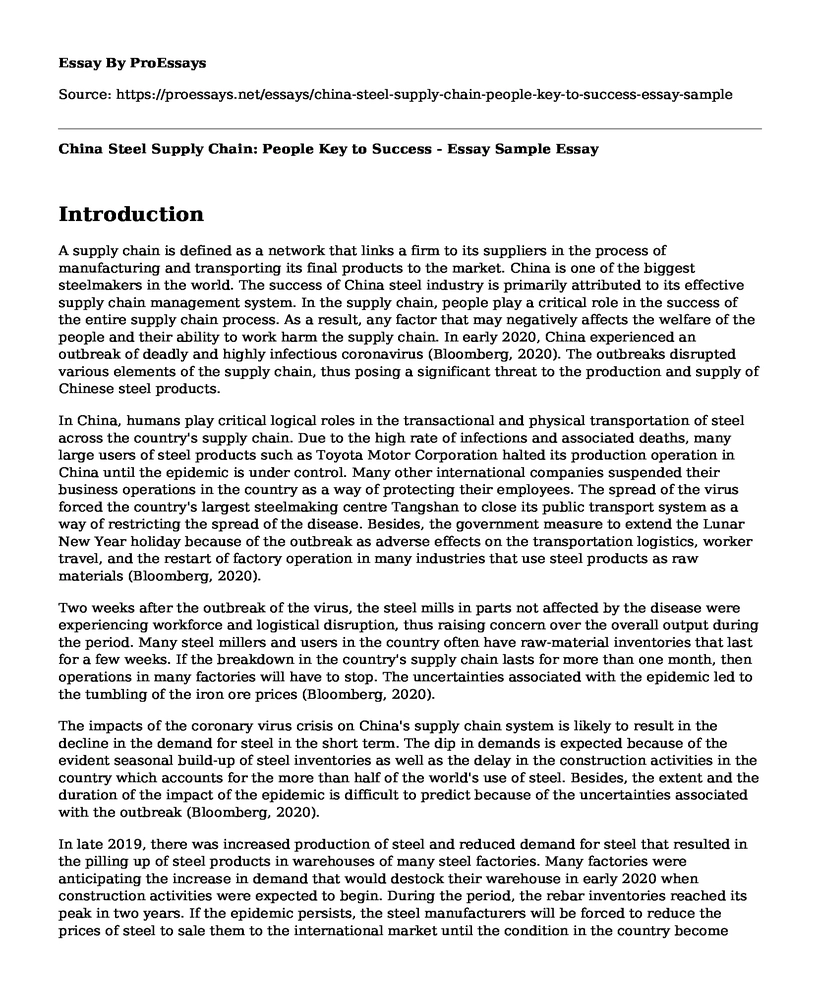Introduction
A supply chain is defined as a network that links a firm to its suppliers in the process of manufacturing and transporting its final products to the market. China is one of the biggest steelmakers in the world. The success of China steel industry is primarily attributed to its effective supply chain management system. In the supply chain, people play a critical role in the success of the entire supply chain process. As a result, any factor that may negatively affects the welfare of the people and their ability to work harm the supply chain. In early 2020, China experienced an outbreak of deadly and highly infectious coronavirus (Bloomberg, 2020). The outbreaks disrupted various elements of the supply chain, thus posing a significant threat to the production and supply of Chinese steel products.
In China, humans play critical logical roles in the transactional and physical transportation of steel across the country's supply chain. Due to the high rate of infections and associated deaths, many large users of steel products such as Toyota Motor Corporation halted its production operation in China until the epidemic is under control. Many other international companies suspended their business operations in the country as a way of protecting their employees. The spread of the virus forced the country's largest steelmaking centre Tangshan to close its public transport system as a way of restricting the spread of the disease. Besides, the government measure to extend the Lunar New Year holiday because of the outbreak as adverse effects on the transportation logistics, worker travel, and the restart of factory operation in many industries that use steel products as raw materials (Bloomberg, 2020).
Two weeks after the outbreak of the virus, the steel mills in parts not affected by the disease were experiencing workforce and logistical disruption, thus raising concern over the overall output during the period. Many steel millers and users in the country often have raw-material inventories that last for a few weeks. If the breakdown in the country's supply chain lasts for more than one month, then operations in many factories will have to stop. The uncertainties associated with the epidemic led to the tumbling of the iron ore prices (Bloomberg, 2020).
The impacts of the coronary virus crisis on China's supply chain system is likely to result in the decline in the demand for steel in the short term. The dip in demands is expected because of the evident seasonal build-up of steel inventories as well as the delay in the construction activities in the country which accounts for the more than half of the world's use of steel. Besides, the extent and the duration of the impact of the epidemic is difficult to predict because of the uncertainties associated with the outbreak (Bloomberg, 2020).
In late 2019, there was increased production of steel and reduced demand for steel that resulted in the pilling up of steel products in warehouses of many steel factories. Many factories were anticipating the increase in demand that would destock their warehouse in early 2020 when construction activities were expected to begin. During the period, the rebar inventories reached its peak in two years. If the epidemic persists, the steel manufacturers will be forced to reduce the prices of steel to sale them to the international market until the condition in the country become favourable (Bloomberg, 2020). With the decline in the demand of steel and high inventories in steel factories, the need for raw materials for producing steel such as metallurgical coal and iron ore is likely to be muted until steel factories in china have cleared its inventories.
From the above discussion, it is evident that the supply chain is critical in the entire overall process of production and consumption of steel products. Any disruption of the supply chain results in significant adverse impacts in the acquisition of raw materials, outputs of finished products, and distribution of steel products to the customers. In China, the steel business heavily relies on the effectiveness and efficiency of the supply chain system.
References
Bloomberg. (2020, January 30). China's Steel Sector Braces as Virus Impacts Top Producer. Retrieved from https://www.supplychainbrain.com/articles/30781-chinas-steel-sector-braces-as-virus-impacts-top-producer
Cite this page
China Steel Supply Chain: People Key to Success - Essay Sample. (2023, Mar 30). Retrieved from https://proessays.net/essays/china-steel-supply-chain-people-key-to-success-essay-sample
If you are the original author of this essay and no longer wish to have it published on the ProEssays website, please click below to request its removal:
- In the Defense of Consumerism Versus the Creation of Discontent
- International Business in China: Articles Analysis Essay
- Factors That Affect Living With Diabetes Essay
- The Family-Based Migration - Paper Example
- Essay Example on Opioid Crisis in Canada: 2800 Deaths in 2016
- Elderly Targeted by Identity Theft - Free Essay Example
- Market Research on Hulu - Report Example







